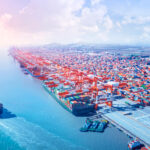Logistics and Transnet are wrecking our country’s growth!
Logistics and Transnet are wrecking our country’s growth!
A fascinating (if depressing) report has revealed that logistics and Transnet are among the factors that are wrecking our country’s growth.
Yes, I am well aware that this is hardly breaking news. Our wonderful and incredibly well-informed columnist Nick Porée (who should be our Minister of Transport) writes about this sorry situation in virtually every issue of FOCUS. Indeed, he has even referred to this report in this month’s column. Another of our equally exceptional columnists, Chris Hattingh, also regularly chronicles Transnet’s downfall.
So, why then did I find the report so fascinating? I think it was the title that really got to me: it’s called South Africa’s Anti-Growth Strategy. An “anti-growth strategy”? I had only heard that term once before. Clothing manufacturer Patagonia launched what was dubbed an “anti-growth strategy” to encourage a conversation about the threat posed to the planet by a global economy that depends on relentless growth and consumerism. Famously, the company even took out an advertisement encouraging people NOT to purchase one of its jackets!
I didn’t think that the same motive could apply to South Africa. So, what on earth was it all about? It turns out that the Centre for Development and Enterprise (CDE), an independent policy research and advocacy organisation, believes this is the path on which South Africa finds itself. In its report, the CDE argues that the country’s slow economic growth of the last 15 years is the result of bad policy choices, a catastrophic decline in government performance, and a devastating lack of leadership.
Ann Bernstein, executive director of the CDE, says that despite rhetoric to the contrary, the South African government does not have a growth strategy. “If anything, it has an anti-growth strategy. South Africa has leaders who say they want growth, and there are a lot of government policy documents that describe how important growth is. However, at no stage has the country’s political leadership made a decisive choice to prioritise growth or put in place the components of sound policy and good governance essential to an effective growth strategy,” she maintains.
The CDE has identified 10 ways in which the government has wrecked South Africa’s growth prospects. Here they are (read and weep):
- Poor policy and bad governance at Eskom
Inadequate energy supply is South Africa’s most critical constraint on growth. We do not have enough generation capacity to keep the economy running to its existing capacity, warns the CDE. Maintaining Eskom’s monopoly has meant that its collapse through corruption, incompetence, and cadre deployment has had catastrophic implications for the whole country.
- Fiscal policy
Stated commitments to spending restraint and debt stabilisation have been violated in practice, whether in the form of excessive wage increases for the public sector or unfunded commitments to free higher education and the expansion of social grants. As a result, says the CDE, public debt has increased nearly eight-fold from around R630 billion in 2007 to nearly R4.7 trillion in 2023. This has led to a steep rise in debt service costs, which absorb a rapidly rising share of tax revenues and divert them from more productive uses.
- Corruption
The Zondo Commission found that the state paid over R57 billion on corruption-tainted contracts to entities associated with the Guptas. Unfortunately, the extent to which corruption has moderated under Cyril Ramaphosa is an open question. What is certain, says the CDE, is that corruption and cadre deployment continue to take place, with a real risk of state capture 2.0 emerging in the future.
- Crime and stability
South Africa’s criminal justice system has become less effective over the past decade. Murder – the category of crime best reported and recorded – has risen by almost 60%. The events of July 2021 have exposed the fragility of public order in South Africa, with huge implications for levels of confidence and investment, especially since no ringleaders have been brought to book.
- Logistics and Transnet
Poor logistics systems mean higher costs for customers, inconvenience, and a brake on SA exports. Transnet’s monopoly on port management and railway infrastructure explains why its services have declined and costs have risen… to the detriment of South African businesses, consumers, and the economy as a whole.
- Mining
Mining revenue is stagnating because of uncertainty about the future trajectory of tax policy, the level and rigidity of wages, and an empowerment model that has increased investment risk. Licensing delays have caused a slowdown in investment projects, while mismanagement of the sector overall has meant that South Africa is an increasingly undesirable destination for mining companies seeking to expand their output.
- Decaying public infrastructure
The CDE also highlights the severe underinvestment in passenger rail, wastewater systems, roads, water infrastructure, and state facilities such as schools, police stations, courtrooms, Home Affairs offices, and hospitals. A key commonality underlying all of these trends is government’s cadre deployment strategy. This has seen the appointment of wholly unsuitable people into key organisations mandated to provide and maintain infrastructure, while also saddling them with an unconstitutional conflict of interest: it is impossible to serve the ANC’s interests and fulfil one’s fiduciary duties to the public organisations one manages.
- Local government
Only 41 of SA’s 257 municipalities received clean audits in 2020/21, while the Department of Cooperative Government and Traditional Affairs declared that 64 were “dysfunctional”. With respect to economic growth, one of the key effects of the declining quality of local infrastructure has been to raise the costs of doing business.
- B-BBEE and localisation
Two government policies aimed at economic transformation – broad-based black economic empowerment (B-BBEE) and industrialisation-through-localisation – have inhibited growth. Products designated for local procurement are generally more expensive or of a lower quality compared to possible imports (which is why local products are not chosen on their own merits), while B-BBEE has raised the costs of doing business and introduced new uncertainties that affect investment plans.
- Lack of leadership
President Ramaphosa, for all his eloquent rhetoric, has presided over a cabinet full of mediocrities who are either incapable or unwilling to address the challenges they face in their portfolios, maintains the CDE. “He has governed by establishing well-intended-but-ineffectual committees while leaving in place ministers who bend and break every prescript of the ministerial handbook and openly question his agenda,” the organisation points out.
The cumulative effect of each poor policy and each example of government failure now far exceeds the already large sum of its individual parts. Concludes Bernstein: “We have a state that is increasingly a brake on growth and unable to deliver on its most basic functions, presiding over deteriorating infrastructure and rapidly rising levels of indebtedness. It is a state in which the corrupt thrive at the expense of good managers, and where the lives of whistle-blowers are increasingly at risk.”
Alas, an “anti-growth strategy” sounds about right…
- South Africa’s Anti-Growth Strategyis the first of a two-part CDE series focusing on economic growth. The second report will identify key policy priorities to remove barriers blocking growth. You can read the executive summary of the first part here.
Published by
Charleen Clarke
focusmagsa




